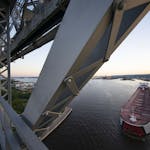Before George Masko parachuted behind enemy lines in Normandy on D-Day, he emptied his pouch of rations, water and a gas mask and filled it with vials of morphine. A medic in the Army's 82nd Airborne Division, Masko chose to forgo his own supplies in favor of stockpiling medicine he knew wounded soldiers would need.
That single moment was reflective of the life George Masko would lead. Family members say he always put the needs of others first. And when it came time for him to be honored for his accomplishments, he turned the attention away from himself and credited those who had helped him.
"That shows you my dad's thinking of others. He was very much a selfless person," said Marshall Masko, George's son. He recalled his father telling him that "when you achieve something great, credit those who helped you, because they will be there to support you again when you most need it."
George Masko died of natural causes March 26 at his home in Phoenix, where he and his wife had moved from Minnesota. He was 96.
Born and raised in Columbia Heights, Masko was the son of Czech immigrants and the youngest of five siblings. Shortly after graduating from high school, Masko was drafted to serve in World War II.
He was a witness to history and tragedy, participating in D-Day, the Battle of the Bulge, the liberation of Holland, the liberation of the Wöbbelin concentration camp and the occupation of Berlin.
After being decorated for his service and discharged, Masko returned home and was drafted to play professional baseball for the Chicago White Sox; he had played on the Army's baseball team and was "naturally really good," said son Marshall.
But Masko ultimately decided to skip the majors and pursue a career in business, which he thought would be more financially sustainable.
He earned a bachelor's degree from the University of Minnesota and went on to become executive vice president of the Pillsbury Co.
Masko developed Pillsbury's refrigerated foods division from a small startup into a leading profit center. In 1965, he tapped Leo Burnett advertising to come up with a mascot, which led to the iconic Poppin' Fresh Doughboy.
He also established a Pillsbury scholarship program for African American youth.
"We actually have the original drawing of the Doughboy," Marshall Masko said. Leo Burnett gifted and addressed it to George, "the father of the Doughboy."
Masko was married for 68 years to his wife, Lucille, whom he met after college. They had three children: Marshall, Melissa and Mary Beth. Mary Beth died in a toboggan accident when she was a child.
Lucille Masko said her husband was a hard worker who came home with a full briefcase each night. That did not stop him from devoting attention to Lucille, calling her the love of his life, and his kids, who he loved spending time with.
George Masko maintained a love for baseball, teaching Marshall to play in Little League and taking him to Twins games on weekends. Masko somehow snagged four tickets to Game 7 of the 1965 World Series, which featured the Los Angeles Dodgers against the Twins, and gave them to Marshall, Lucille and her two sisters. He stayed behind working at the office.
"Those were the selfless things that he did to make things a success," Lucille Masko said.
George Masko is survived by his wife, his son, his daughter and five grandchildren. A funeral was held April 3.
Ryan Faircloth • 612-673-4234




![Kathy Cargill's home in Duluth's Park Point neighborhood. Cargill's limited liability company has purchased more than 20 parcels on the point. ] JANA](https://arc.stimg.co/startribunemedia/BTNQVSCQD5GQLP6YRUSBSH6FQM.jpg?w=75&h=75&fit=crop&crop=faces)
